许国璋英语许式英语语音语法复习二
许国璋英语第二册第二课课文、对话、练习,前微软中国区总经理吴士宏学习英文的教 材
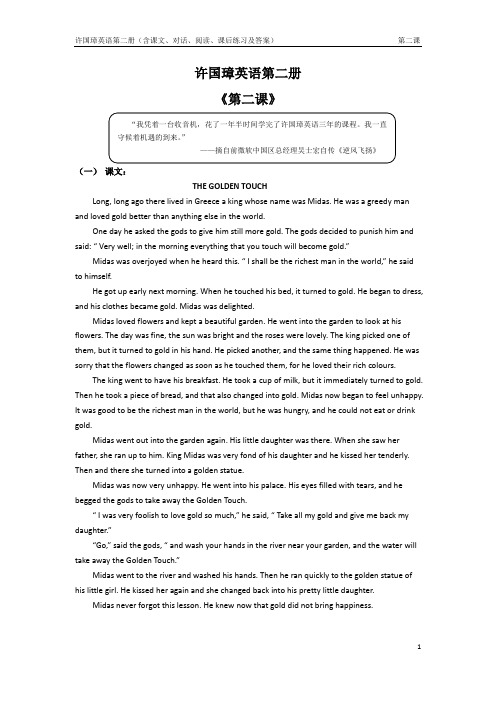
许国璋英语第二册《第二课》(一)课文:THE GOLDEN TOUCHLong, long ago there lived in Greece a king whose name was Midas. He was a greedy man and loved gold better than anything else in the world.One day he asked the gods to give him still more gold. The gods decided to punish him and said: “ Very well; in the morning everything that you touch will become gold.”Midas was overjoyed when he heard this. “ I shall be the richest man in the world,” he said to himself.He got up early next morning. When he touched his bed, it turned to gold. He began to dress, and his clothes became gold. Midas was delighted.Midas loved flowers and kept a beautiful garden. He went into the garden to look at his flowers. The day was fine, the sun was bright and the roses were lovely. The king picked one of them, but it turned to gold in his hand. He picked another, and the same thing happened. He was sorry that the flowers changed as soon as he touched them, for he loved their rich colours.The king went to have his breakfast. He took a cup of milk, but it immediately turned to gold. Then he took a piece of bread, and that also changed into gold. Midas now began to feel unhappy. It was good to be the richest man in the world, but he was hungry, and he could not eat or drink gold.Midas went out into the garden again. His little daughter was there. When she saw her father, she ran up to him. King Midas was very fond of his daughter and he kissed her tenderly. Then and there she turned into a golden statue.Midas was now very unhappy. He went into his palace. His eyes filled with tears, and he begged the gods to take away the Golden Touch.“ I was very foolish to love gold so much,” he said, “ Take all my gold and give me back my daughter.”“Go,” said the gods, “ and wash your hands in the river near your garden, and the water will take away the Golden Touch.”Midas went to the river and washed his hands. Then he ran quickly to the golden statue of his little girl. He kissed her again and she changed back into his pretty little daughter.Midas never forgot this lesson. He knew now that gold did not bring happiness.(二)课文译文点金术很久很久以前,在希腊居住着一位名叫迈达斯的国王。
许国璋英语(第二册)

许国璋英语(第二册) populousadj. 人口稠密的continentn. 洲;大陆Asian. 亚洲Asiann. & adj. 亚洲人,亚洲的American. 美洲North America北美洲South America南美洲Americanadj. 美洲的Europen. 欧洲massn. (聚成一体的)团、块land mass地块geographern. 地理学家regardvt. 认为peninsulan. 半岛the Ural Mountains乌拉尔山脉formvt. 组成;构成dividevt. 划分;隔(分)开dividing line分界线linkvt. 连结;连接exactadj. 确切的;准确的Alaskan. 阿拉斯加(美国一州) connectvt. 连结;连接tipn. 尖端;顶端Siberian. 西伯利亚American Indian美洲印第安人bridgen. 桥梁land bridge地峡settlevi. 定居;安家canaln. 运河the Suez Canal苏伊士运河separatevt. 使分开(离) peakn. 山峰;最高点footn. 英尺altituden. 高度(尤指海拔) uncertainadj. 变化无常的priden. 骄傲religionn. 宗教originatevi. 起源于;发源于Buddhismn. 佛教Christianityn. 基督教Palestinen. 巴勒斯坦Palestiniann. 巴勒斯坦人Islamn. 伊斯兰教Arabian. 阿拉伯半岛principaladj. 重要的;主要的quartern. 四分之一Japanesen. 日本人Iraniann. 伊朗人Iraqin. 伊拉克人Filipinon. 菲律宾人Singaporen. 新加坡人the Asian Games亚运会civilizationn. 文明sciencen. 科学technologyn. (工业)技术missvt. 惦记,想念;错过wonderfuladj. 奇妙的;极好的bitn. 小片a bit of一点quite a bit of相当多(不可数) quite a few相当多(可数) excellentadj. 优秀的;极好的festivaln. 节日the Spring Festival 春节evergreenadj. 常绿的get-togethern. 聚会,“联欢会”get down to开始做solidadj. 坚实;踏实touchn. 接触;v. 触,碰Greecen. 希腊kingn. 国王goldn. 金子worldn. 世界punishvt. 惩罚overjoyedadj. 非常高兴turn to变成delightedadj. 大喜rosen. 玫瑰pickvt. 采摘;拾起happenvi. 发生milkn. 牛奶immediatelyadv. 立刻piecen. 块,片a piece of一块,一片unhappyadj. 不快,苦恼hungryadj. 饥饿drinkvt. 饮fondadj. 喜欢be fond of喜欢kissvt. 吻tenderlyadv. 深情地,温存地then and there当时当地;立刻statuen. (全身)塑像fillvt. 充满tearn. 眼泪begvt. 乞求prettyadj. 漂亮happinessn. 快乐,幸福bedtimen. 就寝的时刻fetchvt. 去拿(取)boilvt. 煮沸boiled煮开的plentyn. 好些,很多thermos bottle n. 热水瓶thanksn. 谢谢thirstyadj. 渴just now刚才steamn. 蒸气;暖气设备n. 错处wondern. 奇事,奇迹no wonder怪不得ice-boxn. 冰箱boxn. 盒子Scotlandn. 苏格兰centuryn. 世纪rulevt. 统治namedvt. 名叫wiseadj. 聪明braveadj. 勇敢的soldiern. 军人,兵士,战士invadevt. 入侵armsn. 武器defencen. 保卫in defence ofagainstprep. 反对enemyn. 敌人scattervt. 使散开;击溃forcevt. 强迫woodn. 树林lonelyadj. 偏僻的;寂寞的rainyadj. 有雨的lievi. 躺着soundn. 声音roofn. 屋顶give up放弃seem看起来,象是usen. 用处spidern. 蜘蛛spinvt. 纺;(吐丝)织(网)n. 网reachvt. 到达toilvi. 艰苦地劳动caren. 关心;注意with care小心地oppositeadj. 相反的,对面的fixvt. 系牢threadn. 丝,线failvi. 失败pooradj. 可怜的;穷的losevt…失掉hopen. & vi. 希望almostadv. 几乎ownadj. 自己的troublen. 烦恼;麻烦swingvt. 摆动;荡slenderadj. 纤细的linen. 线safelyadv. 安全地callvt. 叫;召集sendvt. 送,派messagen. 信息;口信cheern. 鼓舞;欢呼disheartenedadj. 灰心;失望的Scotsmann. 苏格兰人gathervi. & vt. 聚集,集合winvi. & vt. 战胜invadern. 侵略者drivevt. 驱逐;开(车) trainingn. 训练physical training 体育sports groundn. 操场highadj. 高的jumpn. 跳跃either...orconj. 或…或…breakvi. & vt. 打破,破碎break into groups 分为小组volley-balln. 排球to play class three 与第三班比赛holidayn. 假日suggestvt. 提议reservoirvt. 水库the Great Wall长城revisitvt. 再次访问,重游bankn. 河岸the Yungting River 永定河the year before一年前,前一年surroundingadj. 周围的closeadj. 近的;紧密的tien. 系带;(引抻为)联系villagern. 村子里的人spiritn. 精神be in high spirits 情绪很高,兴高采烈stilladj. 安静,不动outsideprep. 在外面well-cultivated adj. 精细耕种的passvt. 经过powern. 威力;电力plantn. 工厂valleyn. 山谷belowadv. & prep. 在下面leapn. 跳跃keep doing something 不断地做某事pleasedadj. 高兴strongadj. 强健;强大achievevt. 取得(成就) sheepn. 绵羊pign. 猪horsen. 马signn. 象征,迹象prosperityn. 繁荣growvi. 成长digvt. 挖,掘pitn. 坑joinvt. 加入,参加excitingadj. 令人兴奋的picnicvi. & n. 野餐addvt. 加上the restn. 其余的人(东西) entrancen. 入口处supposevt. 猜想cameran. 照相机bloomn. 开花be in bloom(花)正开着nonepron. 没有人San Francisco圣弗兰西斯科(旧金山) cityn. 市;城市coastn. 海岸enjoyvt. 喜爱periodn. 课时eachadv. 各;每个meet会见supplyn. (pl.)供应品v. 检查assignmentn. 指定的(课外)作业assignvt. 指定(课外作业) steadilyadv. 持续地punctuationn. 标点符号compositionn. 作文literaturen. 文学;文学作品favouriteadj. 特别喜爱的subjectn. 学科;课目poemn. (一首)诗pourvi. 涌来;源源而来heartbreakingadj. 令人心碎的keenadj. 热心的(观众等) viewern. 观众viewvt. 看televisiontheatren. 戏剧TV theatre电视剧recognizevt. 认出;认识到titlen. 标题recentadj. 最近的;新近的containvt. 包含;有livelyadj. 生动活泼的accomplishvt. 完成(任务等) borevt. 使…感到腻味onceconj. 一旦…(就) guidevt. 引导generaladj. 总的,一般的general cleaning 大扫除broomn. 扫帚dustpann. 盛尘土的簸箕n. 拖把as well也downstairsadv. 在楼下,往楼下furnituren. 家具(统称)tidy upvt. 整理,使整齐cloudn. 云impossibleadj. 不可能sitting-roomn. 客厅,起居室sofan. 长沙发byprep. 在旁边firesiden. 炉边(炉火附近) perfectlyadv. 十分地darlingn. 亲爱的人aboutprep. 在周围,在附近next to在…隔壁bookcasen. 书架,书橱seatn. 座位window-seatn. 窗座drawvt. 拉(上)prayvt. 祷告discovervt. 发现mastern. 主人armchairn. 扶手椅stoutadj. (身体)肥壮的businessn. 事have no business to 无权(做某事) continuevt. & vi. 继续dependentn. 靠人生活的人Maman. 妈妈oughtmod. & v. 应当,应该strikevi. 打击;碰击painn. 疼痛sharpadj. 厉害,剧烈wickedadj. 坏,恶劣的crueladj. 残酷的slave-drivern. 驱使奴隶作工的人graspvt. 抓住shouldern. 肩desperateadj. 什么也不顾的loudadv. 大声地Mrs.n. …夫人lockvt. 锁upstairsadv. 往楼上shamen. 羞耻,可耻的事"For shame!"真不象话!servantn. 佣人turn away赶走poor-housen. 贫民收容所What's on tonight? 今晚有什么活动?picturen. 电影I have no idea我不知道marchn. & vi. 行进,行军the Long March长征savevt. 保留,省下possibleadj. 可能的ministern. 部长shoveln. 锹,铲子volunteern. 义务(志愿)工作者tombn. 陵墓elderlyadj. 上了年纪的personn. 人siten. 场地construction site 工地governmentn. 政府vice-ministern. 副部长departmentn. 部门chargen. 管理in charge of负责(某事) ordinaryadj. 普通的,平常的kilometren. 公里greetingn. 招呼,问候fellown. 人blazing hot炎热rockn. 岩石;石块jokevi. 说笑话melonn. 瓜handcartn. 手推车dripvi. 滴;淌soakvt. 浸透,泡(水) all the while一直地enthusiastically adv. 热情地completevt. 完成schedulen. 完成工作的时间表ahead of schedule 提前be used to习惯于expressvt. 表达feelingn. 感觉,感情furnacen. 炉,熔炉tempervt. 锻炼once in a while每隔一段时间wholeadj. 整个的sweatvi. 流汗;n. 汗watervt. 浇水eggplantn. 茄子manuren. 肥料carrying-polen. 扁担bucketn. 水桶the Great Pyramid大金字塔pyramidn. (埃及的)金字塔ancientadj. 古代的;古老的Egyptn. 埃及(非洲)bodyn. 身体;尸体safeadj. 安全的treasuren. (复数)金银珍宝be located坐落于the Nile River nail尼罗河(非洲)Cairon. 开罗(埃及首都) Egyptianadj. & n. 埃及的,埃及人comparevt. 比较;对照compare...to比作…;比喻为…setvi. (日,月等)落buryvt. 埋葬;葬blockn. 街区;大块averagen. 平均;平均数tonn. 吨machineryn. (总称)机器;机械floodn. 涨水;洪水covervt. (占地)面积为acren. 英亩(合6. 07亩) outdovt. 超过;胜过limestonen. 石灰石coffinn. 棺材;柩preservevt. 防腐(以长久保存) wear away磨损exposedadj. 暴露在外的the Sphinx巨大的狮身人面石像lionn. 狮子the Libyan Desert 利比亚沙漠(非洲) Libya利比亚the Nile Valley 尼罗河流域modernadj. 现代的devotedadj. 忠实的honestadj. 诚实的cottagen. 农舍aloneadv. 独自地millern. 磨坊老板bouquetn. 一束(花)plumn. 李子cherryn. 樱桃realadj. 真正的,真实的sharevt. 分享;分担nobleadj. 高尚的;高贵的in return作为报答suffervi. 受…之苦besidesadv. 而且,此外bothervt. 打搅friendshipn. 友谊primrosen. 樱草pleasuren. 乐趣,愉快priestn. 牧师three-storeyed adj. 三层楼的ringn. 戒指fingern. 手指porridgen. 粥rabbitn. 兔子adj. 傻,愚蠢firen. 火;炉火winen. 酒envyvt. 嫉妒;羡慕flourn. 面粉on credit赊给spellvt. 拼写sleepyadj. 困倦的churchn. 教堂;教会pass on转告;转交recording-room n. 录音室postponevt. 延期progressive adj. 进步的kindadj. 好意的sellvt. 出卖marketwheelbarrown. 手推车stupidadj. 愚蠢的silvern. 银子;银质的buttonn. 钮扣chainn. 链子pipen. 烟斗conditionn. 状态wheeln. 车轮in spite of尽管,虽然generousadj. 慷慨的plankn. 厚木板repairvt. 修理holen. 洞,坑quiteadv. 十分,完全trueadj. 真实的;忠实的sackn. 袋子blowvi. & vt. 吹,刮lanternn. 提灯laddern. 梯子hurtvt. 伤ditchn. 沟set off动身stormyadj. 暴风雨的drownvt. 淹死goatn. 山羊goatherdn. 牧羊人funeraln. 葬礼processionn. (送葬等的)行列chiefadj. 主要的,为首的mournern. 送丧的人every now and thenwipevt. 揩,抹handkerchiefn. 手帕topicn. 题目choosevt. 选择be through完事,做完re-readvt. 再读certainadj. 某些agen. 年纪;时代at the age of 在…岁的时候longvi. 盼望,渴望instructorn. (政治)指导员movevi. 移动stepn. 脚步,步子furtheradv. 再往前dropvi. 掉下;例下,坐下vi. 滚动cheekn. 面颊oxhiden. 牛皮offervt. 主动拿给refusevt. 拒绝insistvi. & vt. 坚持in the end最后give in让步;被迫同意chewvt. 嚼patvt. 拍hardshipn. 艰难困苦whatever pron. 不管什么carry through 进行到底couragen. 勇气snowfalln. 下雪breathevi. 呼吸darevt. 敢push on努力前进lipn. 嘴唇motionvt. 作手势effortn. 努力hurriedlyadv. 急忙地moundn. 小土堆wornadj. 破旧的wheneverconj. 无论什么时候cooladj. 凉爽showern. 阵雨dryadj. 干燥raincoatn. 雨衣umbrellan. 雨伞dreamvi. 做梦studion. 艺术家的工作室marryvt. 和…结婚get married结婚了sweetadj. 甜,香;可爱的earnvt. 挣(钱)dollarn. 美元partvi. 分离nerven. 神经get on one's nerves 使人发烦practisevi. 练习ordervt. 定购bandagen. 绷带funnyadj. 滑稽的,有趣的platen. 盘子spillvt. 溅洒burnvt. & n. 烫伤ironn. 熨斗,烙铁couchn. 躺卧用的发沙发truthn. 真实情况,真话laundryn. 洗衣坊accidentn. 事故accidentallyadv. 偶然地set down放下guessvt. 猜测engine-roomn. 机器房inventionn. 捏造的情况,发明organizevt. 组织itemn. 项目pigtailn. 辫子(口语用) successn. 成功faultyadj. 有毛病actingn. 演技intonationn. 语调scoldvt. 责备,斥责questionvt. 提问,考问play truant逃学blackbirdn. 山鸟whistlevi. 发出清脆的叫声edgen. 边缘Prussian. 普鲁士Prussianadj. 普鲁士的drillvi. (军事)操练meadown. 草地sawmilln. 锯木厂towardsprep. 向,朝着mayorn. 市长,镇长bulletin boardn. 布告牌victoryn. 胜利defeatn. 失败blacksmithn. 铁匠noticen. 通知,布告;vt. 发觉make fun of开玩笑schoolyardn. 学校的院子out of breath喘不过气来repeatvt. 重复occasionallyadv. 偶尔rulern. 戒尺silencen. 安静;沉默orderlyadj. 有秩序的schoolmaten. 同学walk up and down来回走着embroideredadj. 绣花的seated坐着kneen. 膝盖Berlin柏林(德国首都) frightenvt. 使害怕,使惊骇postvt. 张贴(布告) extraadj. 额外的;多余的ticketn. 戏(车)票pardonn. 原谅Beg pardon?对不起,请再说一遍managevi. (经过努力)做到crossvt. 穿过regretvt. 对某事感到后悔wastevt. 浪费tiresomeadj. 讨厌的liftvt. 抬起tonguen. 舌头;(引抻为)语言finallyadv. 最后地attentivelyadv. 注意地dotted about点缀着scratchvi. 发出搔括声;vt. 抓,搔pigeonn. 鸽子coovi. (鸽子)叫obligevt. 迫使impressvt. 印;留下印象in concert齐声地clockn. 钟risevi. 升起;站起chalkn. 粉笔chokevt. 使哽咽不能成声lettern. 字母leanvi. 倚,靠dismissvt. 打发走;解散analyzevt. 分析complexadj. 复杂的complex sentence 复合句predicaten. 谓语clausen. 从句,分句qualifyvt. 修饰,限定functionn. 作用adverbialn. & adj. 状语(的) phrasen. 短语modifyvt. 形容,修饰simple sentence简单句objectn. 宾语attributiveadj. 定语的voyagen. 航行,航海acrossprep. 越过,横过the Atlantic Ocean大西洋arguevi. 辩论sailorn. 水手scholarn. 学者princen. 王子sailvi. 航行Europeanadj. & n. 欧洲的,欧洲人dreamern. 梦想家faithn. 信心,信仰Spainn. 西班牙Spanishadj. 西班牙的interestedadj. 有兴趣routen. 路线,航路Indian. 印度shipn. 船so thatconj. 以便carry out实行,执行inhabitvt. 居住rejoicevi. 高兴,欢喜rejoicingn. 欢庆,欢欣hailvt. 欢呼;致敬epoch-making adj. 划时代的discoveryn. (某事的)发现honourn. 荣幸,光荣respectn. & vt. 尊敬jealousadj. 妒忌be jealous of 妒忌(某人) discoverern. 发现者seamann. 海员Italyn. 意大利dinnern. 宴会;午饭,晚饭conceitedadj. 骄傲自大的uncomfortableadj. 不舒服,难堪beyondprep. 在…那边islandn. 海岛fussn. 大惊小怪gentleman绅士;先生guestn. 客人experimentn. 试验,实验roundn. 圆圈go the rounds在众人手中(口中)传开entirelyadv. 完全地shelln. 壳uprightadv. 挺立absolutelyadv. 绝对地;真是marvellousadj. 奇妙的;好极了aeroplanen. 飞机up-to-dateadj. 最新式的equipmentn. 装备,设备producevt. 生产resultn. 结果thanks to由于artn. 艺术scholarshipn. 奖学金scenen. (戏剧中的)场,景high school中学;高级中学curtainn. 幕布;(转义为)幕下fireplacen. 壁炉paintvi. & vt. 绘画paintingn. 绘画appearvi. 出现;显出congratulatevt. 向…道贺talentn. 才能ought tov. 应该,理应racen. 种族discriminationn. 歧视prejudicen. 偏见hushinterj. 嘘(叫人不讲话) shyadj. 害羞的,羞怯的softadj. 软的;柔和的light brown浅褐色的dark brown深褐色的artistn. 艺术家awardn. 奖金cent sentn. 一分钱paintern. 画家acceptvt. 接受congratulationn. 道贺,祝贺committeen. 委员会speechn. 演说over-excitedadj. 过于激动invitevt. 邀请gratefuladj. 感激freshadj. 新鲜的;鲜嫩的talladj. 高(指人身等) polen. 竿stepchildn. 前妻(前夫)所生子女nervouslyadv. 神情激动地artisticadj. 艺术的valuen. 价值equaladj. 相等的;平等的worthadj. 值得opinionwarnvt. 警告sympathyn. 同情decisionn. 决定kindnessn. 好意completely adv. 完全地be taken aback 惊愕convenient adj. 方便talentedadj. 有才能的lowervt. 放低,低下libertyn. 自由justicen. 公平,正文the latter pron. 后者break away挣脱,挣开lapn. 膝上would rather 宁愿vt. 杀害,谋杀because of由于。
许国璋英语第二册第四课课文、对话、练习、答案

许国璋英语第二册第四课课文、对话、练习、答案许国璋电视英语教学第二册《第四课》(一)课文:1)课文原文:AN OUTINGWe were discussing where to go for an outing during the spring holidays. Some suggested the Guanting Reservoir. Others wanted to see the Great Wall. Then someonesaid: “ Why not go back to Anzhuang for a visit?”At this we all cheered. Of course, we would revisit that beautiful mountain village on the banks of the Yongding River!The place was dear to us all. We had gone there the year before to plant trees in the surrounding mountains. We had formed close ties with the villagers.So early next morning we were off to Anzhuang on the 7:30 train. It was a fine day in April. Everyone was in high spirits. We could hardly sit still, for there were so manyinteresting sights outside the windows. We saw new factories and well-cultivated fieldsall along the line. At Shijingshan we passed the huge steel mill and the power plant. Then suddenly we saw the green Yongding River in the valley below. Our hearts gave a leap, for we knew that in a few minutes we would be with our friends at Anzhuang again.They were overjoyed to see us. The old villagers kept asking how we were. They were pleased to see how much stronger some of us had become. Then some old friends of ours took us to see what they had achieved. New houses, larger schools, more sheep,more pigs and chickens, more cows and horses – everywhere we saw signs of prosperity.Then we climbed the mountains. The villagers showed us the trees we had planted. Wewere happy to see that most of them were growing well. At one place we found someyoung people digging pits. They were getting things ready for this year’s tree-planting.We all joined them in the work.But the time soon came for us to return. It was getting dark.We told our friends that we would soon come back to plant trees again.Back in the train, we told each other what a wonderful time we had had that day.“An outing like this is certainly more exciting than picnicking in t he Summer Palace,”one comrade said.“ Or on the Great Wall,” another added.They spoke for us all.一次效游我们正在讨论在春假期间去哪里郊游。
新编许国璋英语(第二册)
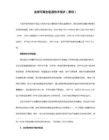
载客量
velocity
n.速度
supertrain
n.超级火车
electricity
n.电;电流
on the basis of
就…而论
overall cost
包干成本
performance
n.性能
edge
n.优势
sales campaign
n.厕所;洗手间
without
没有;不(接动名词)
declare
v.宣告
break out
爆发
on its part
在美国方面
drop
vt.丢;投掷
atom bomb
n.原子弹
Hiroshima
n.广岛
Nagasaki
n.长崎
thereupon
conj.因此;随即
manicure
vt.修剪
shaded
a.林荫遮蔽的
owe...to
归功于…
prolonged prosperity
长期的繁荣
statesmanship
n.治理国家的才能
premier
n.总理
shrewd
a.精明的
resolute
a.果断的
frugal private life
对…起作用
to be more precise
更确切地说
factors in education and mana
教育与经营方面的因素
entrepreneur
n.企业家
许国璋英语第二册第八课课文、对话、练习讲义
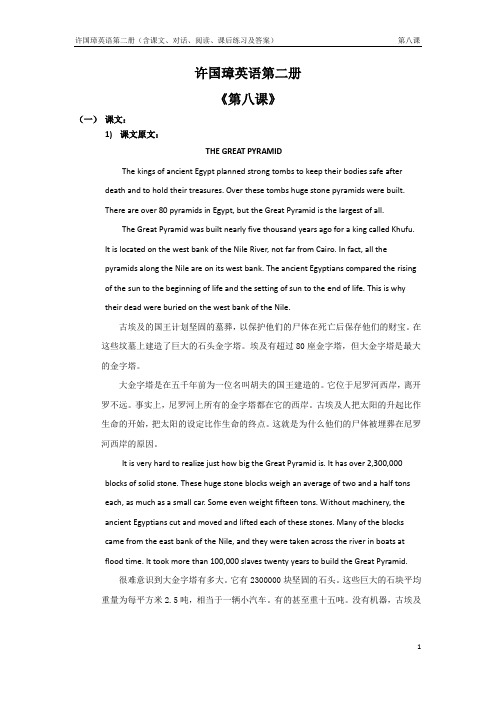
许国璋英语第二册《第八课》(一)课文:1)课文原文:THE GREAT PYRAMIDThe kings of ancient Egypt planned strong tombs to keep their bodies safe after death and to hold their treasures. Over these tombs huge stone pyramids were built.There are over 80 pyramids in Egypt, but the Great Pyramid is the largest of all.The Great Pyramid was built nearly five thousand years ago for a king called Khufu.It is located on the west bank of the Nile River, not far from Cairo. In fact, all thepyramids along the Nile are on its west bank. The ancient Egyptians compared the rising of the sun to the beginning of life and the setting of sun to the end of life. This is whytheir dead were buried on the west bank of the Nile.古埃及的国王计划坚固的墓葬,以保护他们的尸体在死亡后保存他们的财宝。
在这些坟墓上建造了巨大的石头金字塔。
埃及有超过80座金字塔,但大金字塔是最大的金字塔。
大金字塔是在五千年前为一位名叫胡夫的国王建造的。
它位于尼罗河西岸,离开罗不远。
事实上,尼罗河上所有的金字塔都在它的西岸。
许国璋英语第二册第五课(含课文、对话、阅读、课后练习及答案)
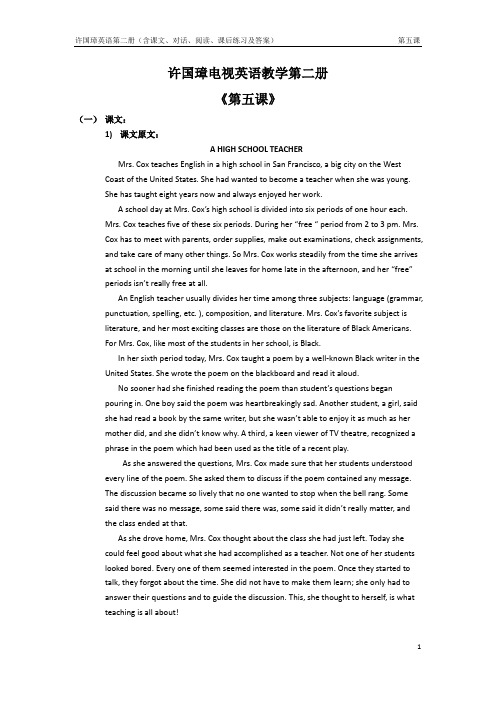
许国璋电视英语教学第二册《第五课》(一)课文:1)课文原文:A HIGH SCHOOL TEACHERMrs. Cox teaches English in a high school in San Francisco, a big city on the West Coast of the United States. She had wanted to become a teacher when she was young.She has taught eight years now and always enjoyed her work.A school day at Mrs. Cox’s high school is divided into six periods of one hour each.Mrs. Cox teaches five of these six periods. During her “free “ period from 2 to 3 pm. Mrs.Cox has to meet with parents, order supplies, make out examinations, check assignments, and take care of many other things. So Mrs. Cox works steadily from the time she arrivesat school in the morning until she leaves for home late in the afternoon, and her “free”periods isn’t really free at all.An English teacher usually divides her time among three subjects: language (grammar, punctuation, spelling, etc. ), composition, and literature. Mrs. Cox’s favorite subject isliterature, and her most exciting classes are those on the literature of Black Americans.For Mrs. Cox, like most of the students in her school, is Black.In her sixth period today, Mrs. Cox taught a poem by a well-known Black writer in the United States. She wrote the poem on the blackboard and read it aloud.No sooner had she finished reading the poem than student’s questions began pouring in. One boy said the poem was heartbreakingly sad. Another student, a girl, saidshe had read a book by the same writer, but she wasn’t able to enjoy it as much as hermother did, and she didn’t know why. A third, a keen viewer of TV theatre, recognized aphrase in the poem which had been used as the title of a recent play.As she answered the questions, Mrs. Cox made sure that her students understood every line of the poem. She asked them to discuss if the poem contained any message.The discussion became so lively that no one wanted to stop when the bell rang. Somesaid there was no message, some said there was, some said it didn’t really matter, andthe class ended at that.As she drove home, Mrs. Cox thought about the class she had just left. Today she could feel good about what she had accomplished as a teacher. Not one of her studentslooked bored. Every one of them seemed interested in the poem. Once they started totalk, they forgot about the time. She did not have to make them learn; she only had toanswer their questions and to guide the discussion. This, she thought to herself, is whatteaching is all about!2)原文译文:一位高中教师考克斯夫人在美国西海岸一座大城市旧金山的一所高中教英语。
许国璋的英语科普知识

许国璋的英语科普知识Xu Guozhang is a renowned Chinese scientist and science communicator who has dedicated his life to promoting scientific literacy and popularizing scientific knowledge among the general public. As an accomplished physicist and a passionate educator, Xu has made significant contributions to advancing scientific understanding and fostering a culture of scientific curiosity in China.One of Xu's key strengths is his ability to translate complex scientific concepts into accessible and engaging language. He firmly believes that science should not be confined to the ivory tower but should be shared with everyone, regardless of their educational background or scientific expertise. Through his extensive writing, public lectures, and media appearances, Xu has successfully bridged the gap between the scientific community and the general public, making scientific knowledge both understandable and relevant to people's everyday lives.Xu's expertise in popular science covers a wide range of topics, from the fundamental principles of physics and the mysteries of theuniverse to the latest advancements in biotechnology and the implications of artificial intelligence. His engaging and thought-provoking presentations have captivated audiences across China, and his books and articles have become essential reading for those seeking to deepen their understanding of the natural world and the scientific processes that shape it.One of Xu's most notable contributions to popular science is his ability to contextualize scientific discoveries and their real-world applications. He has a keen understanding of the social, economic, and environmental implications of scientific progress, and he often explores these connections in his work. For example, in his book "The Future of Energy," Xu delves into the challenges and opportunities presented by the transition to renewable energy sources, highlighting the technological breakthroughs, policy decisions, and societal shifts that will be necessary to achieve a sustainable energy future.Xu's passion for science communication is not limited to his own work; he is also a tireless advocate for promoting scientific literacy more broadly. He has been instrumental in the development of science education initiatives in China, working with policymakers, educators, and community organizations to ensure that students of all ages have access to high-quality science learning opportunities. Through his leadership and mentorship, Xu has inspired a newgeneration of science communicators to follow in his footsteps, further expanding the reach and impact of popular science in China.Moreover, Xu's influence extends beyond the borders of China. He has established collaborations with international scientific organizations and has participated in global forums on science communication and public engagement. By sharing his experiences and insights with colleagues around the world, Xu has contributed to the global effort to bridge the gap between science and society, fostering a more scientifically literate and engaged global citizenry.One of the hallmarks of Xu's approach to popular science is his ability to make complex topics both engaging and intellectually stimulating. He has a remarkable talent for breaking down intricate scientific concepts into easily understandable analogies and narratives, while still preserving the depth and nuance of the underlying science. Whether he is explaining the workings of the human brain, the formation of black holes, or the principles of quantum mechanics, Xu's presentations are characterized by a unique blend of scientific rigor and storytelling flair.Xu's commitment to science communication is also reflected in his unwavering dedication to truth and objectivity. He is a fierce advocate for evidence-based reasoning and scientific integrity, and he is not afraid to challenge misinformation or pseudoscience thatthreatens to undermine public trust in science. Through his clear and compelling explanations of the scientific method and the importance of critical thinking, Xu has empowered his audiences to approach scientific claims with a discerning eye, separating fact from fiction and embracing the open-ended nature of scientific inquiry.In addition to his work as a science communicator, Xu is also an accomplished researcher and educator. He has made significant contributions to the field of physics, with a particular focus on the study of quantum phenomena and the development of innovative technologies. Throughout his career, Xu has mentored numerous students and young researchers, inspiring them to pursue their own scientific passions and to become active participants in the scientific community.Xu's impact on the landscape of popular science in China cannot be overstated. His tireless efforts to demystify science and to foster a culture of scientific curiosity have had a profound and lasting impact on the public's understanding and appreciation of the natural world. Through his engaging and accessible presentations, his thought-provoking writings, and his unwavering commitment to scientific integrity, Xu has become a revered figure in the Chinese scientific community and a trusted source of information for the general public.As China continues to emerge as a global leader in scientific research and innovation, the work of individuals like Xu Guozhang will become increasingly important. By inspiring a new generation of scientists and science communicators, and by cultivating a more scientifically literate and engaged citizenry, Xu is paving the way for a future in which science and society are inextricably linked, working together to address the pressing challenges of our time and to unlock the boundless potential of human knowledge and discovery.。
许国璋英语第二册(带音标)
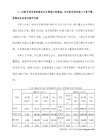
Alaska [ə'læskə] n. 阿拉斯加(美国一州)
connect [kə'nekt] vt. 连结;连接
tip [tip] n. 尖端;顶端
Siberia [sai'biəriə] n. 西伯利亚
American Indian [] 美洲印第安人
beg [beg] vt. 乞求
pretty ['priti] adj. 漂亮
happiness ['hæpinis] n. 快乐,幸福
bedtime ['bedtaim] n. 就寝的时刻
fetch [fetʃ] vt. 去拿(取)
boil [bɔil] vt. 煮沸
boiled [] 煮开的
holiday ['hɔlədi] n. 假日
suggest [sə'dʒest] vt. 提议
reservoir ['rezəvwa:] vt. 水库
the Great Wall [] 长城
revisit ['ri:'vizit] vt. 再次访问,重游
bank [bæŋk] n. 河岸
populous ['pɔpjuləs] adj. 人口稠密的
continent ['kɔntinənt] n. 洲;大陆
Asia ['eiʃə] n. 亚洲
Asian ['eiʃən] n. & adj. 亚洲人,亚洲的
America [ə'merikə] n. 美洲
North America [] 北美洲
- 1、下载文档前请自行甄别文档内容的完整性,平台不提供额外的编辑、内容补充、找答案等附加服务。
- 2、"仅部分预览"的文档,不可在线预览部分如存在完整性等问题,可反馈申请退款(可完整预览的文档不适用该条件!)。
- 3、如文档侵犯您的权益,请联系客服反馈,我们会尽快为您处理(人工客服工作时间:9:00-18:30)。
许式英语复习二一.词类(一)名词(noun—n.)(内容在“许式英语复习一”里)(二)动词(verb—v.) (同上)(三)代词(pronoun—pron.):可分为人称代词、物主代词、反身代词、相互代词、指示代词、疑问代词、关系代词、连接代词、不定代词九类。
1.指示代词this, that, these, those在句中可用作:1)主语This is Jane. That is Bob.This is a telephone. That is a TV set. This /That is not / isn‘t a computer.―Is this a telephone?‖ ―Yes, it is.‖―Is that a computer?‖ ―No, it is not / isn‘t. It is a TV set.‖These are cars. Those are buses. They are not / aren‘t jeeps.―Are these buses?‖ ―No, they are not. They are cars.‖Those are newspapers. They are not / aren‘t magazines.―What are those?‖ ―They are newspapers.‖2) 宾语You should always keep this in mind. 我们应当经常记住这一点。
Better take that with you. 最好把那个带着。
3) 表语My idea is this. 我的意见是这样。
4) 定语For these reasons we have to cancel the trip. 由于这些原因,我们只好取消这次旅行。
2.1)作主语要用主格。
(注意动词be 要随不同的人称和数而变化,即: I am,you are, he is, she is, it is, we are, you are , they are.。
)例如:I am / am not a teacher. You are /are not an engineer. He is /is not a CEO. Sheis/ isn‘t a doctor.We are students. You are civil servants(公务员). They are players(运动员).They are not /aren‘t actors(演员).―Are you a teacher?‖ ―Yes, I am.‖ ―No, I am not.‖―Is he a model worker(模范工人)?‖ ―Yes, he is. ‖ ―No, he is not /isn‘t.‖―How are you?‖ ―I‘m fine, thank you.‖2)作宾语要用宾格。
例如:Let me try again. 让我再试试。
They like him very much. 他们都很喜欢他。
She gave them a lot of books. 她送给他们很多书。
3)做表语时多用宾格,特别是在口语中。
例如:Who is knocking at the door? ----- It‘s me. 谁在敲门?----- 是我。
If I were her, I would take the advice. 我要是他就接受这个意见。
但在下面这种结构中却常用主格:It was he who did it. (强调)是他做了这事。
It is she who wants it. (强调)是她想要这个。
3.物主代词:表明事物关系的词。
物主代词分形容词性和名词性的。
(1)容词性的物主代词只能作定语,放在名词前面:May I know your name? ------ My name is Li Xin.Is this his mobile phone? ------ Yes, it is.This is our teaching building.(2)名词性的物主代词代表了形容词性物主代词及其后面的名词,起名词的作用,在句中:1)作主语Your magazine is new, but mine is old.This is our classroom. Theirs is on the third floor.2)作动词宾语I have lost my dictionary. May I use yours? 我把字典丢了。
我能用你的吗?Let‘s clean their room first and then ours。
让我们先打扫他们的房间,然后再打扫我们的。
3)作表语This is your suitcase(箱子), and that is his.4.疑问代词:疑问代词who, whom, whose, what, which都是用来构成特殊疑问句的。
who通常作表语,whom作宾语;例如:Who is speaking? 是哪一位(打电话)?Whom do you wish to speak? 你找谁接电话?Who /whom did you mean? 你指的是谁?(口语中常用who代替whom.)Who/whom are you talking about? 你们在说谁?With whom did you go? 你和谁一道去的?(如果前面有介词时,就仍旧用whom,但口语中说Who did you go with? 时更多些。
)其他三个疑问词可以用作1)主语What happened next? 后来怎么样了呢?Whose is better? 谁的好一些?Which is yours? 哪个是你的?2) 表语W hat‘s your father?你父亲是干什么的?Whose is it? 这是谁的?They are so alike, you can‘t tell which is which.他们是那样相象,你都分不出谁是谁了。
3) 宾语What do you mean? 你是什么意思?Which do you prefer, tea or coffee? 你愿意要哪一种,茶还是咖啡?Whose are you going to borrow? 你预备借谁的?4) 定语What time shall we meet again? 我们什么时候再碰头?Which train will you take? 你搭那一班火车?Whose umbrella is this? 这是谁的雨伞?5.反身代词I can‘t express myself in English. 我不能用英语表达思想。
Take good care of yourself. 好好保重。
2)作表语I am not quite myself these days. 我近来身体不大舒服。
That poor boy was myself. 那个可怜的孩子就是我。
3)作主语或宾语的同位语,多译为“本人”或“本身”; 有时常用来加强语气,常译为“自己”或“亲自”:The theory itself is all right. 这理论本身没有问题。
We‘d better ask the president himself about it. 最好问校长本人。
You yourself did it. / You did it yourself. 这是你自己做的事。
They themselves are to blame. / They are to blame themselves.这得怪他们自己。
He says he‘ll do it himself. 他说他将亲自办这件事。
反身代词间或可作主语(代替人称代词):Both my sister and myself asked to go and work there.我妹妹和我都要求到那里工作。
She was as anxious as I was.她和我一样着急。
oneself也是一个反身代词,用法和其他的相同,例如:One should not live for oneself alone. 一个人不应该只为自己活着。
6. 不定代词1)both“两个都…), either“(两个中)任一的”, neither“两者都不;哪一个都不”:指两个人或物。
它们可以作主语、宾语、定语, 例如:Both (of you) are right. (你们)两人全对。
(谓语动词用复数形式)Either (of the books) will do. (两本书)随便哪一本都可以。
(谓语动词用单数形式)Neither (of the answers) is correct. (两个回答)哪一个都不对。
(谓语动词用单数形式)I‘ll take both (of them) with me.我把他们两人都带去。
You may take either with you. 两个中间你随便带哪一个去。
I agree with neither of you. 你们两人的话我都不同意。
Both (the) seats are taken. 两个座位都有人占了。
You may take either road. 两条路你走哪一条都行。
Neither seat is occupied. 两个座位一个也没人占。
另外both还可以作同位语(这时要注意both的位置):You and I are both to blame. 我们两人都有错。
(跟在动词be 后)They both agreed to stay. 他们两人都答应呆下去。
(放在实意动词前面)2)all ―人人、大家、全体、一切、全部”:用来指三个或三个以上的人或物时可用作主语、宾语、定语、同位语:All of us are fond of sports. 我们都喜欢运动。
(谓语动词用复数形式)I want all of you to make rapid progress. 我希望你们全都迅速进步。
All roads lead to Rome. 条条大路通罗马。
They all agreed to stay there. 他们都同意呆在这儿。
They are all for her. 他们全支持她。
在谈到不可数的东西时,可用作主语、宾语、定语、表语,例如:All is going well. 一切进行得很好。
(谓语动词用单数形式)Grasp all, lose all. 什么都抓,什么都抓不住。
